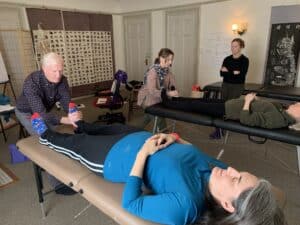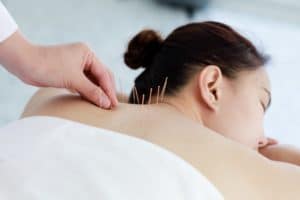Five Element Acupuncture and Depression: a Paradigm Shift
Five Element acupuncture is rooted in holistic, ecological understanding of human emotions and emotional distress. Radically different from Western biomedicine, the paradigm of Five Element theory opens up new perspectives on healing from depression. We see choices that we couldn’t see before, and can embrace new options in treatment and lifestyle. Changing how we think changes how we live.
Everyone feels blue from time to time. What does it really mean to be depressed? When is depression an illness? Is it ever a healthy emotional response? If we explore our darker feelings, instead of pushing them away, we can see the roots of depression and heal at a deeper level.
Five Element Acupuncture: Body, Mind and Spirit are One
Five Element acupuncture theory and ancient Chinese medicine view body, mind and spirit as an inseparable whole. Emotions and thought are rooted in the body and do not exist without it. The ideogram xin 心 translates as both heart and mind. The xin 心 (heart/mind) governs the spirit or shen 神. Union of body, mind and spirit is embedded in the Chinese language and in the way people think about themselves and their emotions. Five Element acupuncture brings this perspective to the level of treatment for depression and other ailments, treating body, mind and spirit together as one.
Modern science and biomedicine, on the other hand, are rooted in Cartesian dualism, the sixteenth century philosophy of Rene Descartes. Mind and body are seen as closely linked but nonetheless completely divisible. Mind and body can exist independently of one another. Soul, or spirit, is within the realm of mind.
Western psychology and theories of emotional illness are rooted in mind-body dualism. As a result, we split emotions apart, seeing them, on the one hand, as disembodied abstractions of mind, or, on the other hand, reducing them to mere biochemistry. Mind-body dualism is embedded in the way we think, and in the way we treat depression. The standard therapies for treating depression are either through the conscious mind with counseling, or through biochemistry with drugs. Mind and body are split.
Mind-body dualism is a powerful philosophy that brought Western culture a new, potent way of understanding the world through science. It was a great idea five hundred years ago, but left us with some sticky questions that plague us today. While modern biomedicine is coming around to recognizing mind-body interdependence, ancient Chinese medicine and Five Element acupuncture provide us with a foundation of understanding that has been developed over thousands of years. Old wisdom brings new options for healing.
Five Element Acupuncture and Emotions: Ecology of Body-Mind
In Five Element acupuncture theory, each of the Five Elements manifests in nature in the seasons of the yearly cycle. Each of the Five Elements manifests within the body-mind in different organ systems and energy systems (the acupuncture meridians). Each of the Five Elements governs an aspect of emotions, as well. Like the seasons of nature, the organs, meridians and emotions of Five Element theory are intricate, interdependent systems of constant flow – an ecology of body-mind.
Five Element acupuncture theory links the inner ecology of body-mind to the outer ecology beyond our skin, in the seasonal cycles of the natural world. Human beings are embedded in the web of life. Illness happens when this connection to nature is damaged or lost.
The body-mind is a self-healing, adaptive system. It will always do its best to heal itself. Emotions are part of the adaptive response of a healthy body-mind. That includes uncomfortable emotions like fear, anger and grief. Emotions exist for a reason, rooted in instinct. Unfortunately, in Western culture, we are often taught to repress difficult emotions and label them as undesirable or pathological. We attach stigma to mental health problems and “blame the victim” for feeling depressed and unhappy, instead of looking at the root cause.
Emotions are the messengers of healing, communicators between the body-mind and conscious self. If we ignore the messenger, it’s like turning off the fire alarm without putting out the fire. Depression, anxiety, fear, sadness and anger carry a message. We need to listen.
Five Element theory teaches us to embrace difficult emotions as part of the natural cycle. In a healthy, balanced body-mind system, emotional states come and go, like the seasons of the year. Emotions are the landscape of the spirit. We move through the swamplands of depression, the meadows of joy, the oceans of fear, and many other places in the 心 (xin) heart/mind. Emotions bring richness, beauty and color to life.
Emotions can become illness when we are stuck in one emotional state and unable to move out of it. The body-mind is an adaptive, self-healing system and does its best to heal. Nonetheless, through life experience or trauma, we may get stuck in an emotional pattern that no longer serves us. When we are stuck, the Five Elements become imbalanced. We feel overwhelmed, making it difficult to function day-to-day. An imbalance in the Five Elements keeps us from living life fully.
Depression and Imbalance in the Five Elements
What are the emotions of the Five Elements and how do they relate to depression? The short answer is that all of the Five Elements are related to depression. A depressed person may suffer an imbalance in any of the Five Elements, depending on the root cause of his/her depression. Each of the Five Elements gives us a different lens on depression. Here, we will focus on two: the Metal Element (grief) and the Wood Element (anger). The Fire Element (joy) is discussed in a separate blog post.
Grief is Not Depression: The Metal Element
Grief is the emotion associated with the Metal Element and the season of Autumn. It’s easy to confuse grief and depression. They share some characteristic feelings of sadness and emptiness, and someone who is grieving may appear to be depressed. Yet, painful though it may be, grief is a natural response to loss,. It’s a process that we go through and come out the other side. We are transforming our loss into something precious, taking what is of value from it to nourish future life.
Sometimes, however, a major loss or life trauma can leave someone trapped in grief and unable to let go, leading to clinical depression. Feelings of sadness and emptiness persist unabated for months or even years. The person is cut off from life, and may lose his/her sense of self esteem. This is different from healthy grief, yet the roots of depression may be found in unprocessed grief or loss.
Depression, Disempowerment and Anger: the Wood Element
At first glance, it seems curious that anger, emotion of the Wood Element and Spring, could be the root cause of depression. In Western culture, we think of anger as an aggressive, hostile, destructive force. Anger seems quite the opposite of the resignation, despair, unending sadness and low self-esteem that are symptoms of depression.
Anger in Chinese is a much more inclusive concept. Anger has not only an active, outward expression but also a passive, inward expression. If someone is unable to give vent to anger, the feelings turn inward, leading to utter resignation, hopelessness and despair.
The link between anger and depression is disempowerment. The Chinese ideogram for anger, nu 怒, combines the symbols for woman, hand and heart. As discussed in an earlier blog post, the Upside of Anger, nu 怒 is an image of the feelings of a female slave under the hand of a master. She is the lowest and most disempowered person on the social hierarchy. Anger is the appropriate emotional response to injustice, yet she has no avenue to vent her feelings. No wonder she becomes depressed.
Depression Is Not a Disease: Blaming the Victim
Exposure to violence, neglect, abuse and poverty – in other words, disempowerment – are well-known risk factors for depression. Depression is twice as common today in women as in men. While there may be physiological factors that put women at risk, it is a mistake to attribute depression entirely to gender biochemistry. Women are more likely to be victims of violence and abuse. Women are more likely to live in poverty, experience pay discrimination and be subjected to harassment in the workplace.
All of the socioeconomic factors that disempower women can create a life history of personal trauma, and are perfectly valid reasons to feel depressed. Of course, disempowerment impacts men, too. Loss of income and social status is especially hard on men, and can lead to depression.
Ancient Chinese wisdom leads us to an inconvenient truth that Western biomedicine would prefer to ignore. Clinical depression has roots in social inequality and personal trauma, not simply individual biochemistry. Moreover, biochemical changes happen in response to environment and stress, making it debatable whether biochemistry is cause or effect.
Yet, the standard Western treatment for depression – psychoactive drugs – is entirely biochemical. We are turning off the fire alarm without putting out the fire. Drugs may even serve to amplify social inequality and trauma by ignoring the root causes. We turn psychic suffering into a disease, rather than seeing it as a response that makes sense in an unhealthy environment. We “blame the victims” by labeling depression as an illness.
If we no longer view depression entirely as a disease of biochemistry, we shift our view to seeing it as a response of body and mind to a disordered environment and traumatic life history. The question we ask is no longer “What’s wrong with you?” but “What happened to you?” Framing it in this way can be painful, because you start to think about your life and what has happened.
Antidepressants can have real benefits, and individual biochemistry does contribute to depression. Medication can help jump-start the healing process. For some profoundly depressed clients, medication may be needed long term. Looking at the roots of depression in personal trauma, abuse, discrimination, poverty or other life history may be too painful for someone who is severely depressed.
Yet, the cost of blaming the victims is high. We live in a country where nearly one in four middle-aged women is taking antidepressants at any given time, and some one in five adults is taking at least one drug for a mental health issue. Unfortunately, antidepressants often are not completely effective in eliminating depression, and the efficacy tends to decrease over time. Withdrawal from antidepressants has its own problems, and many patients experience side effects.
Five Element Acupuncture: Mind-Body Healing for Depression
Five Element acupuncture can facilitate healing from depression in a unique ways. Emotions and memory are held in the tissues and energy of the body, below the level of consciousness, linking body and mind. Much of this emotional material, especially early childhood experience, is pre-verbal or non-verbal memory. It can’t be accessed through language and the thinking mind.
Five Element acupuncture helps us safely access traumatic emotional material held in the body. It creates a container where pre-verbal emotional material can be released without consciously re-visiting painful memories and life experiences. Clients often say they feel better without knowing why. It feels as if something just left, leaving the person lighter and brighter.
Along with facilitating the release of emotional material, Five Element acupuncture simultaneously addresses physical symptoms that often accompany depression, such as poor concentration, sleep problems, headaches and body pain. Physical and emotional symptoms have the same root cause, and Five Element acupuncture treats the root. Acupuncture has a balancing, or homeostatic, effect on systems of the body. It can help resolve hormone imbalances, immune problems, and other physiological issues that may underlie or trigger depression.
A third way that Five Element acupuncture helps depression is by reconnecting us to the web of life. The cycles of the Five Elements operate within us and in the world around us. Our bodies and minds respond to signals from the outside world. We are creatures of the earth, and we are social creatures. We thrive on meaningful connection with the natural world and with each other. Illness begins when that connection is lost. By restoring the Five Elements within the body/mind, Five Element acupuncture creates the opportunity for reconnection that heals.




